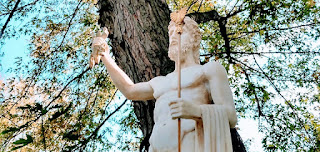Omens and signs are talked about extensively in various religions around the world, and notably in that of ancient Greece. They've been proven true to immense glory, and also misinterpreted to perilous disaster. However, those were usually ones of great questions and inquiries. Many of us don't realize that good and bad omens can be sent to us in our general lives each day. They are so beneficial and yet so simple that we may not think about it. One of the unique things about the ancient Greek Gods is that they were always willing to counsel humans, but it was up to the human to take the advice or leave it. The Gods didn't impose it. So we must, to an extent, train ourselves to recognize that advice.
On the first page of Book II of The Odyssey, a man named Aegyptius speaks generally at the Assembly of Ithaka. The dialogue is nothing profound, simply of goodwill toward the person who had called the meeting, which was Telemachus himself. It says that Telemachus, despite his grave situation, immediately saw this speech as a good omen, and burst forth with his own passionate words to the men present. And of course, this helped set the course for the future.
But why would something so simple be interpreted as a favorable sign from the Gods, or from what Spirits or Heroes, it may be? Perhaps to philosophize on this answer, we should go to the later words of the philosopher Democritus. "Now, as of old, the Gods give men all good things, excepting only those that are baneful, injurious and useless. These, now as of old, are not gifts from the Gods."
I would say that it's simply the ability to recognize good, especially when you are in the midst of a turbulent time like Telemachus. I'll describe two sets of omens that I have experienced in my own life, one spectacular and one common. After my son had been delivered in the hospital NICU at 24 weeks, severely premature and his mother with life-threatening complications, the number 4 was his birthdate, 4 was his incubator number, and 4444 was my wife's discharge room number. This is the number of good fortune and prosperity. Sure enough, both my wife and son left the hospital in good health. A more immediate example in my life, I would say, would have been my release from my longtime depression and anxiety medications, which I talked about in the previous blog post. It seemed like a bad situation at the time, because no matter how much I tried, I could not get my doctor to refill it; not even a single word from them. But I think it was a sign that it was time for me to stop, and it turned out to be one of the best decisions of my life.
You recognize good signs and omens by understanding that, whatever the Gods give, it is beneficial.
In the Goodness of the Gods,
I'll see you at the next Herm down the road,
Chris Aldridge.






.jpg)
